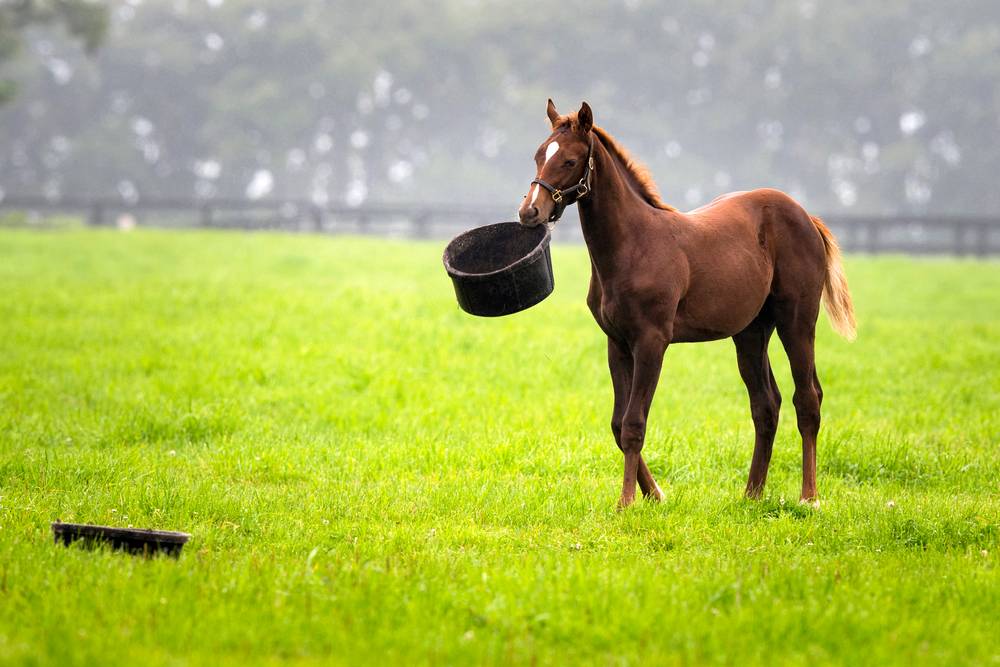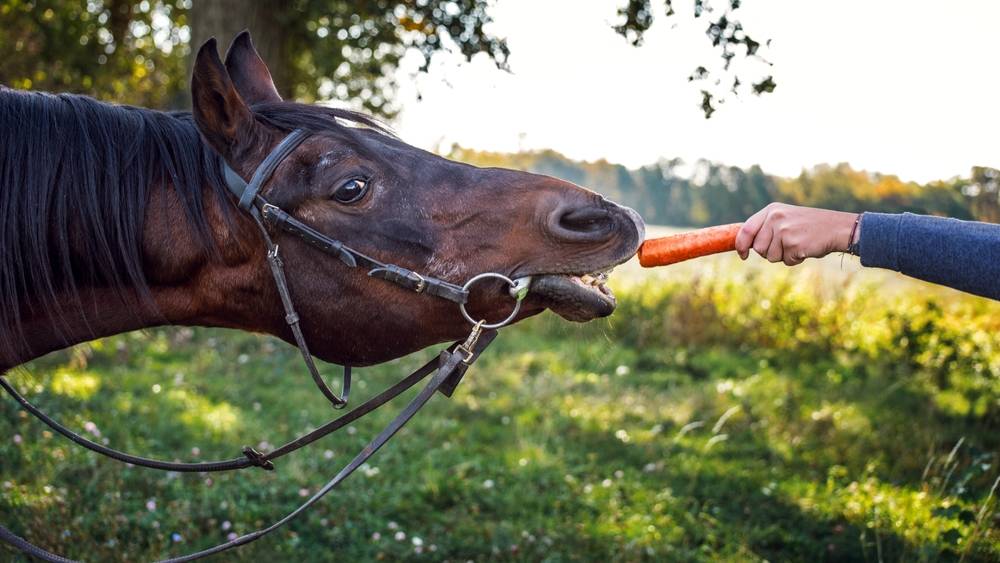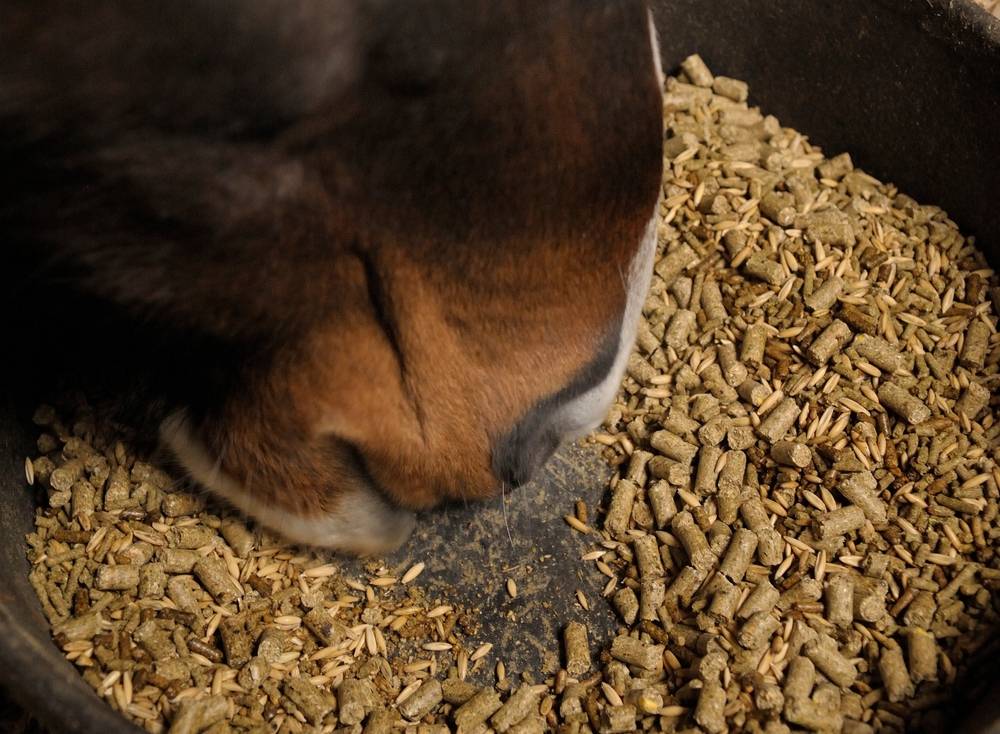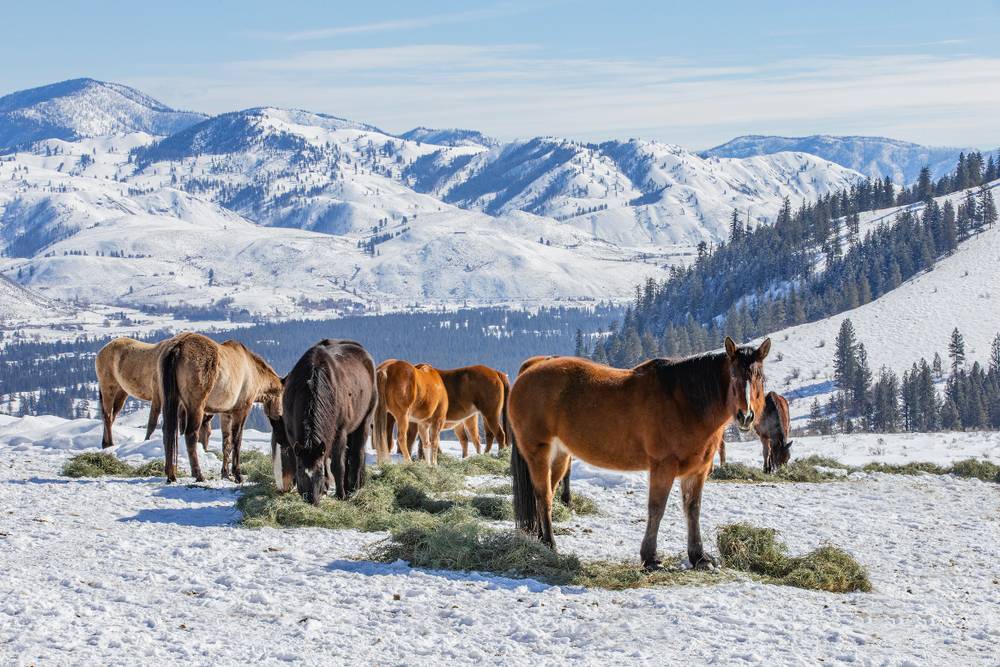
Horses have played a paramount role in human history and agriculture for centuries. However, ongoing scientific research has sparked a discussion regarding whether equines are exclusively herbivorous or if they might exhibit certain omnivorous tendencies. This article explores the horse’s diet, examining their anatomy, evolutionary history, and horse’s digestive system.
So, Are Horses Omnivores or Herbivores?
Horses are mainly herbivores with a specialized anatomy that is well-suited for consuming fibrous plant material. These include flat grinding teeth and a long digestive system. Although there are occasional instances of omnivorous behavior, equines are predominantly herbivorous.
Anatomy and Physiology of Horses
In order to understand the dietary habits of horses, let’s examine their intricate anatomy and physiology. Equines have specialized dentition, particularly their large grinding molars and premolars, which are perfectly adapted for breaking down fibrous plant material. Their digestive systems, consisting of a sizable cecum and colon, are designed to process cellulose-rich vegetation and extract nutrients efficiently through fermentation. These unique adaptations align with the characteristics of herbivorous animals. Thus, horses primarily eat plants as true herbivores.

Herbivorous Adaptations in Horses
Horses are herbivores by nature, a characteristic deeply ingrained in their evolutionary past. These animals can trace their lineage back to the dog-sized Hyracotherium, an early ancestor that roamed the Earth millions of years ago. Throughout their evolutionary journey, equines gradually transformed into grazing animals (who eat grass), adapting their physiology and dietary habits to thrive on a plant-based diet.
One of the most notable signs of their herbivorous nature is their significant dependence on a diet rich in fiber. Horses primarily feed on fibrous vegetation like grasses in their natural environment. Their digestive system, specifically designed to break down and extract nutrients from these plant materials, further solidifies their classification as herbivores. The presence of a caecum for fermentation, as well as an enlarged cecum and colon, underscores their specialization in processing plant matter.
Omnivores and Their Food Choices
Omnivores are animals with a diverse and adaptable diet, consuming both plant and animal matter. They have physiological adaptations that enable them to consume a myriad of food sources, including fruits, vegetables, grains, insects, and various forms of animal protein.
Humans are classic examples of omnivores, as our sharp teeth and digestive systems are designed for both plant-based and animal-based foods. Omnivores often exhibit behavioral and anatomical traits that allow them to exploit different ecological niches, making them versatile in adapting to various environments. This carnivorous diet flexibility provides an evolutionary advantage by allowing plant- and meat-eating animals to access a wider spectrum of nutrients and energy sources in their ecosystems.

Omnivorous Tendencies in Horses
While scientific evidence overwhelmingly supports the classification of horses as herbivorous, there have been occasional instances of omnivorous behavior observed among these equines. On rare occasions, there have been cases of horses eating meat of small animals like birds, rodents, or insects (check the Deadly Equines book). These uncommon occurrences challenge the conventional notion of equines as strict herbivores and raise questions regarding their dietary adaptability.
Researchers propose that various factors, such as nutritional deficiencies or environmental conditions, may influence such behaviors. It appears that horses may exhibit opportunistic feeding habits under specific circumstances.
Factors Influencing Diet Flexibility
The eating habits of horses can vary due to different factors. One significant factor is the environment, where limited forage or extreme weather conditions may force horses to seek alternative food sources, potentially leading to omnivorous behavior. Social dynamics within horse populations can also impact their dietary preferences, as dominant individuals may have access to a wider scope of food options, influencing the choices of the group. The existence of individual variation in dietary preferences among equines further emphasizes the complexity of their decision-making when it comes to food.
The Ethical and Practical Implications
The ongoing discussion surrounding the dietary habits of horses has significant ethical and practical implications. Ethically, it prompts important inquiries about the proper care and feeding of horses kept by horse owners. Should caregivers take into account the potential for occasional omnivorous tendencies when developing diets for their equine companions? From a practical standpoint, it highlights the significance of providing horses with nutritionally balanced diets to promote the horse’s health that meets their dietary requirements while acknowledging their ability to adapt to different food sources.

Frequently Asked Questions
Can Horses Eat Meat?
Horses have the ability to eat meat, but it is not a natural or recommended component of their diet. As herbivores, their digestive system is specifically designed for plant eaters. While there may be instances of consuming meat, it is neither a substantial nor a beneficial aspect of their dietary needs.
Can Horses Digest Meat?
Horses are not adapted for digesting meat. Their digestive system, which includes their teeth and specialized gut, is specifically designed for processing fibrous plant material. Although wild horses can consume and eliminate small quantities of meat, it is not efficiently digested, and a diet high in meat can result in health problems.
What Is the Healthiest Food for Horses?
The most nutritious diet for an average horse includes quality forage, like grass or hay, that offers crucial fiber and nutrients. Customized commercial horse feeds or pelleted concentrates can supplement their diet, meeting their specific requirements. Adequate fresh water is also vital. Seeking guidance from a veterinarian or equine nutritionist can assist in determining the optimal diet for individual horses, considering factors such as the horse’s weight, age, activity level, and overall health.
Conclusion
While horses display many characteristics of herbivores, recent scientific research has revealed occasional instances of omnivorous behavior, challenging our conventional understanding. These sporadic occurrences, influenced by factors such as nutritional deficiencies and environmental conditions, suggest a level of dietary adaptability in equines that warrants further investigation. As we navigate the realm of equine care and nutrition, it is crucial to acknowledge this intricacy and approach the feeding of these animals with a well-rounded perspective, drawing from both traditional knowledge and new scientific insights.
It is substantial to conduct additional research on the digestive process to completely understand the complexities of equine nutrition. We should remain receptive to the idea that horses, like other animals in the food chain, may have a more diverse taste than previously assumed.
